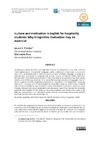Identificador persistente para citar o vincular este elemento:
https://accedacris.ulpgc.es/jspui/handle/10553/70382
| Campo DC | Valor | idioma |
|---|---|---|
| dc.contributor.author | Fielden Burns, Laura Victoria | en_US |
| dc.contributor.author | Rico García, Mercedes | en_US |
| dc.date.accessioned | 2020-02-19T18:18:59Z | - |
| dc.date.available | 2020-02-19T18:18:59Z | - |
| dc.date.issued | 2017 | en_US |
| dc.identifier.issn | 1133-1127 | en_US |
| dc.identifier.uri | https://accedacris.ulpgc.es/handle/10553/70382 | - |
| dc.description.abstract | Hospitality students are the future negotiators of cultural interaction in our field, and how they imagine culture through their language studies is important. In particular, cultural concepts form an essential part of their motivation to learn a foreign language, in so far as it indicates their willingness to integrate into another culture, as Gardner (1960; 2007) and Dörnyei (2001;1994) have demonstrated. In fact, this integrative motivation has been recognized as one of the key elements for a successful learning outcome in languages. Our research explores whether integrative motivation is ubiquitous in the English for hospitality classroom. In a study with 51 adult English for Hospitality students, it found that students saw culture as malleable and showed a mixed motivational orientation. Based on these findings, some relevant curriculum implications are discussed. Apart from having the necessary practical skills required in the industry, hospitality students and workers also need to be effective communicators by understanding the roots of cultural awareness and the possibility of having more than one cultural identity. | en_US |
| dc.description.abstract | Estudiantes de programas de hostelería y restauración deberán dominar la interacción cultural en su campo profesional, por lo que el concepto de negociación y entendimiento cultural debe estar estrechamente ligado al estudio de la lengua. En concreto, los conceptos culturales forman una parte esencial de la motivación para aprender idiomas extranjeros. La motivación integral aparece como uno de los elementos claves para el éxito en el aprendizaje de idiomas en distintos ámbitos y especialidades (Gardner (1960; 2007) y Dörnyei (2001; 1994). En este contexto, nuestra investigación explora si la motivación integral es ubicua en el aula de inglés para fines profesionales. En un estudio con 51 adultos cursando módulos de inglés profesional aplicado al sector hotelero, se observa que los alumnos entienden a la cultura como cambiable, y demuestran una motivación mixta hacia el aprendizaje lingüístico (integral e instrumental). A partir de las conclusiones extraídas, se presentan implicaciones curriculares para el desarrollo del inglés para fines ocupacionales en el aula. Más allá de tener las competencias lingüísticas necesarias, los estudiantes y futuros trabajadores de hostelería necesitan comunicarse de forma efectiva, entendiendo el concepto de multiculturalidad, y siendo conscientes de la importancia de la identidad cultural. | en_US |
| dc.language | eng | en_US |
| dc.relation.ispartof | LFE. Revista de Lenguas para Fines Específicos | en_US |
| dc.source | LFE. Revista de lenguas para fines específicos [eISSN 2340-8561], v. 23 (2), p. 334-358 | en_US |
| dc.subject | 570107 Lengua y literatura | en_US |
| dc.subject | 550510 Filología | en_US |
| dc.subject.other | Hospitality | en_US |
| dc.subject.other | Motivation | en_US |
| dc.subject.other | English for Specific Purposes (ESP) | en_US |
| dc.subject.other | Culture | en_US |
| dc.subject.other | Integrative | en_US |
| dc.subject.other | Adults | en_US |
| dc.subject.other | Hostelería | en_US |
| dc.subject.other | Motivación | en_US |
| dc.subject.other | Inglés para fines específicos | en_US |
| dc.subject.other | Cultura | en_US |
| dc.subject.other | Motivación integral | en_US |
| dc.subject.other | Adultos | en_US |
| dc.title | Culture and motivation in English for hospitality students: Why integrative motivation may be essential | en_US |
| dc.type | info:eu-repo/semantics/article | en_US |
| dc.type | Article | en_US |
| dc.identifier.doi | 10.20420/rlfe.2017.185 | en_US |
| dc.investigacion | Artes y Humanidades | en_US |
| dc.type2 | Artículo | en_US |
| dc.identifier.ulpgc | Sí | es |
| dc.description.esci | ESCI | |
| dc.description.dialnetimpact | 0,0 | |
| dc.description.dialnetq | Q3 | |
| dc.description.dialnetd | D6 | |
| dc.description.erihplus | ERIH PLUS | |
| item.fulltext | Con texto completo | - |
| item.grantfulltext | open | - |
| Colección: | Artículos | |
Visitas 10
159
actualizado el 10-ene-2026
Descargas
111
actualizado el 10-ene-2026
Google ScholarTM
Verifica
Altmetric
Comparte
Exporta metadatos
Los elementos en ULPGC accedaCRIS están protegidos por derechos de autor con todos los derechos reservados, a menos que se indique lo contrario.
